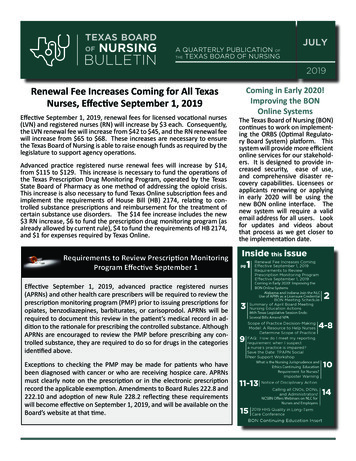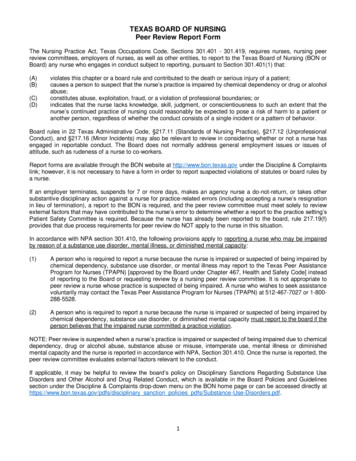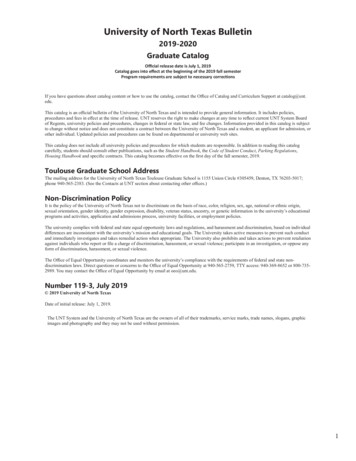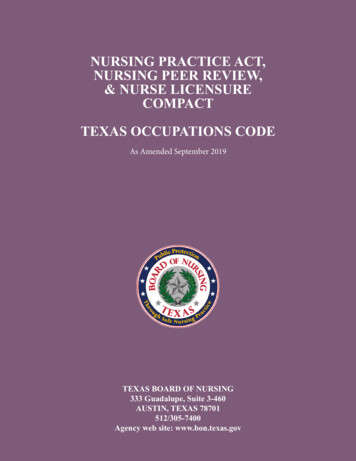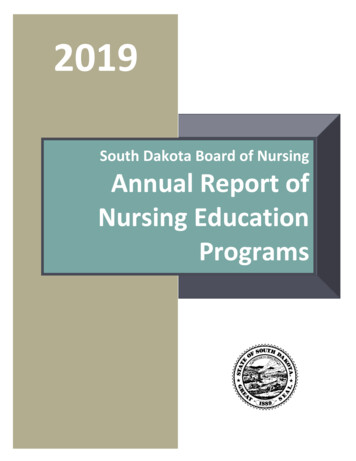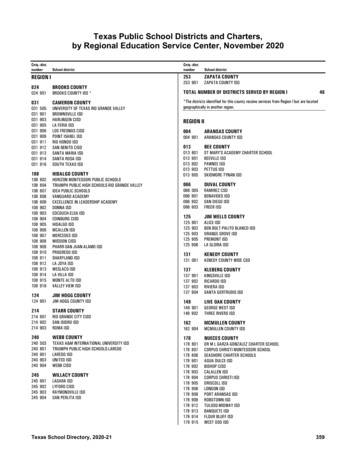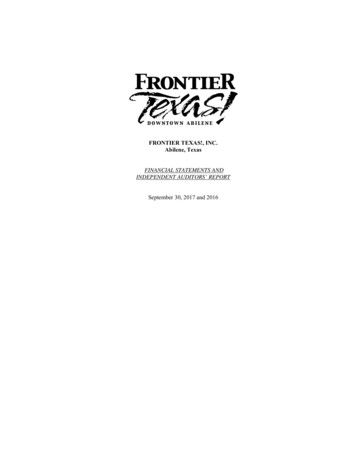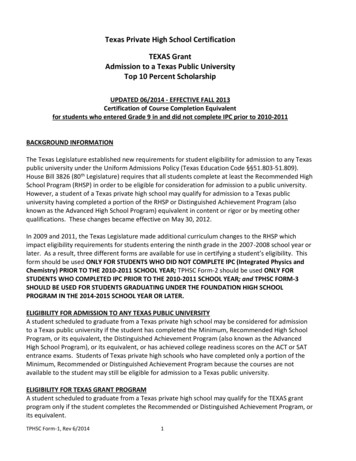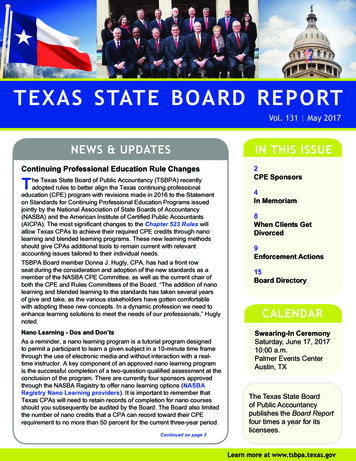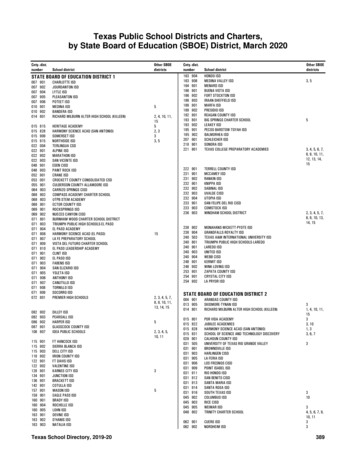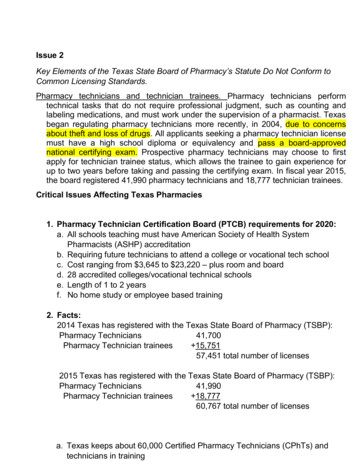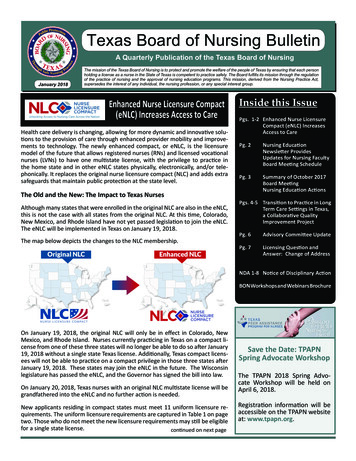
Transcription
Texas Board of Nursing BulletinA Quarterly Publication of the Texas Board of NursingJanuary 2018The mission of the Texas Board of Nursing is to protect and promote the welfare of the people of Texas by ensuring that each personholding a license as a nurse in the State of Texas is competent to practice safely. The Board fulfills its mission through the regulationof the practice of nursing and the approval of nursing education programs. This mission, derived from the Nursing Practice Act,supersedes the interest of any individual, the nursing profession, or any special interest group.Enhanced Nurse Licensure Compact(eNLC) Increases Access to CareHealth care delivery is changing, allowing for more dynamic and innovative solutions to the provision of care through enhanced provider mobility and improvements to technology. The newly enhanced compact, or eNLC, is the licensuremodel of the future that allows registered nurses (RNs) and licensed vocationalnurses (LVNs) to have one multistate license, with the privilege to practice inthe home state and in other eNLC states physically, electronically, and/or telephonically. It replaces the original nurse licensure compact (NLC) and adds extrasafeguards that maintain public protection at the state level.The Old and the New: The Impact to Texas NursesAlthough many states that were enrolled in the original NLC are also in the eNLC,this is not the case with all states from the original NLC. At this time, Colorado,New Mexico, and Rhode Island have not yet passed legislation to join the eNLC.The eNLC will be implemented in Texas on January 19, 2018.The map below depicts the changes to the NLC membership.Inside this IssuePgs. 1-2 Enhanced Nurse LicensureCompact (eNLC) IncreasesAccess to CarePg. 2Nursing EducationNewsletter ProvidesUpdates for Nursing FacultyBoard Meeting SchedulePg. 3Summary of October 2017Board MeetingNursing Education ActionsPgs. 4-5Transition to Practice in LongTerm Care Settings in Texas,a Collaborative QualityImprovement ProjectPg. 6Advisory Committee UpdatePg. 7Licensing Question andAnswer: Change of AddressNDA 1-8 Notice of Disciplinary ActionBON Workshops and Webinars BrochureOn January 19, 2018, the original NLC will only be in effect in Colorado, NewMexico, and Rhode Island. Nurses currently practicing in Texas on a compact license from one of these three states will no longer be able to do so after January19, 2018 without a single state Texas license. Additionally, Texas compact licensees will not be able to practice on a compact privilege in those three states afterJanuary 19, 2018. These states may join the eNLC in the future. The Wisconsinlegislature has passed the eNLC, and the Governor has signed the bill into law.On January 20, 2018, Texas nurses with an original NLC multistate license will begrandfathered into the eNLC and no further action is needed.New applicants residing in compact states must meet 11 uniform licensure requirements. The uniform licensure requirements are captured in Table 1 on pagetwo. Those who do not meet the new licensure requirements may still be eligiblefor a single state license.continued on next pageSave the Date: TPAPNSpring Advocate WorkshopThe TPAPN 2018 Spring Advocate Workshop will be held onApril 6, 2018.Registration information will beaccessible on the TPAPN websiteat: www.tpapn.org.
January 2018eNLCTexas Board of Nursing BulletinVolume 49, No. 1continued from previous pageTable 1The Texas Boardof NursingBOARD MEMBERSOfficersKathleen Shipp, MSN, RN, FNPPresident, representing AdvancedPractice NursingLubbockPatricia "Patti" Clapp, BAVice-President, representing ConsumersDallasMembersNina Almasy, DNP, MSN, RNrepresenting LVN EducationAustinDeborah Bell, CLU, ChFC, RIArepresenting ConsumersAbileneLaura Disque, MN, RNrepresenting RN PracticeEdinburgThe overall eNLC membership numbers have not diminished from the previous NLC. Ifanything, numbers are growing! Texas remains a compact state, affording Texas nursesthe ability to respond to the challenges of modern health care, and provide borderlessnursing services in other eNLC states.For complete information go to: htm and spNursing Education Newsletter Provides Updatesfor Nursing FacultyThe Nursing Consultants for Education at the Board of Nursing have published nineNursing Education Newsletters since June 2014 for nursing program faculty and interested readers. The Newsletter provides updates, information, and topics of interest to nursing faculty. The newsletters can be accessed on the BON web siteunder the Education link. The October Newsletter included information about theeffect of Hurricane Harvey on nursing education programs, how to plan for the rightsimulation in the nursing program, and the use of Clinical Teaching Assistants in RNprograms. You are invited to review the issues of the newsletter at the following link:https://www.bon.texas.gov/nursing newsletters.asp.Texas Board of Nursing Meeting Schedule2018 BoardMeeting Dates2018 Eligibility and DisciplinaryCommittee Meeting DatesJanuary 18-19April 19-20July 19-20October 25-26February 13March 13May 8June 12August 21September 11November 13December 11All Board and Eligibility & Disciplinary Committee Meetings will be held in Austin at theWilliam P. Hobby Building located at 333 Guadalupe, Austin, Texas, 78701.2Allison Edwards, DrPH, MS, RN, CNErepresenting BSN EducationBellaireDiana Flores, MN, RNrepresenting RN PracticeHelotesDoris Jackson, DHA, MSN, RNrepresenting ADN EducationPearlandKathy Leader-Horn, LVNrepresenting LVN PracticeGranburyBeverley Jean Nutall, LVNrepresenting LVN PracticeBryanDavid Saucedo, II, BArepresenting ConsumersEl PasoFrancis Stokes, BArepresenting ConsumersPort AransasExecutive DirectorKatherine A. Thomas, MN, RN, FAANThe Texas Board of Nursing Bulletin isthe official publication of the Texas Boardof Nursing and is published four times ayear: January, April, July, and October.Subscription price for residents within thecontinental U.S. is 15.00, plus tax.Published by:TEXAS BOARD OF NURSINGVOLUME XLIX - No. IPublication Office:333 Guadalupe, Suite 3-460Austin, Texas 78701-3944Phone: (512) 305-7400Fax: (512) 305-7401Publication Date: 12/15/2017
January 2018Texas Board of Nursing BulletinVolume 49, No. 1Summary of ActionsA regular meeting of the Board of Nursing was held October 26-27 2017, in Austin.The following is a summary of Board actions taken during this meeting.In the December 1, 2017 issue ofthe Texas Register, the Texas Boardof Nursing (BON or Board) proposedamendments to §217.9, concerningInactive and Retired Status.Theproposed amendments clarify thata nurse whose license is in “retired”status may not engage in the practice of nursing. While a volunteerretired nurse may practice nursingin compliance with the limitationsof §217.9(e), a nurse whose licenseis in “retired” status may not. To theextent the current text of the subsection is unclear in this regard, theproposed amendments clarify thisexisting restriction.In the December 8, 2017 issue of theTexas Register, the Board proposedamendments to: §213.23, concerning Decision of the Board; §213.27,concerning Good Professional Character; §214.9, concerning Programof Study; §217.12, concerning Unprofessional Conduct; as well as repeal and replacement of §213.28,concerning Licensure of Individualswith Criminal History.At its January 2017 meeting, theBoard of Nursing charged its Advisory Committee on Licensure, Eligibilityand Discipline (Committee) to reviewrecommendations made by the Sunset Advisory Commission during thereview of the agency during the 85thLegislative cycle and provide proposedchanges to the Board. The Committeemet on May 12, 2017; June 9, 2017;August 11, 2017; and September 15,2017 to review the Commission’s recommendations and comply with theBoard’s charge. Proposed changes to§213.27, §213.28, and §217.12 arethe Committee’s recommendations inresponse to the Sunset Commission’sfindings.Proposed amendments to §213.23 arenecessary for consistency with statutory changes enacted by passage ofHouse Bill (HB) 2950 by the 85th TexasLegislature. At the July 2017 meetingof the Board, the BON Advisory Committee on Education (ACE) was chargedwith reviewing Board Rule 214.9 andmaking recommendations for changesfollowing a review of clinical hour re-quirements of other states for vocational nursing programs that showedthat 66% have no minimum numberof hours for vocational nursing educational programs and 62% have nominimum clinical hour requirement.See related article on page six.In the December 15, 2017 issue ofthe Texas Register, the Board proposed amendments to §217.2, concerning Licensure by Examinationfor Graduates of Nursing EducationPrograms Within the United States,its Territories, or Possessions. Proposed amendments to §217.2 arenecessary due to passage of HB 2950which requires the Board of Nursingto develop rules, with stakeholder input from the BON ACE, defining substantially equivalent standards to beused to recognize out-of-state programs and to provide a path to initiallicensure for graduates of out-ofstate programs that are determinednot to be substantially equivalent toBoard standards for Texas programs.See related article on page six.Nursing Education Actions - October 2017 Board MeetingReviewed Reports on:Status Report on New Nursing Education Programs and Currently Active and Potential Proposals; StatusReport on Programs with Sanctions;Report on Communication Activitieswith Nursing Education Programs.Approved Reports of Survey Visits:Brazosport College Vocational Nursing (VN) Education Program in LakeJackson,Brazosport College Associate DegreeNursing (ADN) Education Program inLake Jackson,Concorde Career College ADN Education Program in Dallas,Dallas Nursing Institute ADN Education Program in Richardson,El Centro College ADN Education Program in Dallas,Galveston College VN Education Program in Galveston,Kilgore College VN Education Programin Longview, andVernon College VN Education Programin Wichita Falls.Approved Change in Approval Statusfrom Conditional to Full ApprovalNortheast Texas Community CollegeADN Education Program in Mt. Pleasant, and3Patty Hanks Shelton School of Nursing Baccalaureate Degree NursingEducation Program in Abilene.Approved Reports on:Summary of Self-Study Reportsfor Professional Nursing EducationPrograms for the 2016 NCLEX-RN Examination Year.Approved Application for an Innovative Pilot Project:Del Mar College ADN EducationProgram in Corpus Christi.
January 2018Texas Board of Nursing BulletinVolume 49, No. 1Transition to Practice in Long Term Care Settings in Texas, a CollaborativeQuality Improvement ProjectNina Almasy, DNP, RN; Michelle Dionne-Vahalik, MSN, RN; & Tracie Harrison, PhD, RN, FAAN, FGSAIn spring of 2016, the Quality Monitoring Program (QMP) of the Health andHuman Services Commission (HHSC)embarked on a multi-entity partnership to develop a novel training program for nurses transitioning to employment within long term care (LTC)facilities in the state of Texas. Althoughthis was one of many initiatives QMPspearheaded to improve the quality ofcare and support the workforce in LTCsettings affected by limited resourcesand high nurse turnover rates (TexasCenter for Nursing Workforce Studies,2016), Transition to Practice (TTP) waschosen because of the unique combination of partnerships it created forthe benefit of Texas nursing.The National Council of State Boardsof Nursing (NCSBN) defines a TTP program as “A formal program of activelearning for all newly licensed nurses(registered nurses and licensed practical/vocational nurses) designed tosupport their progression from education to practice across all settings”(NCSBN, 2008, p. 3). The need for TTPprograms was initially spelled out inthe 2010 Institute of Medicine (IOM),Future of Nursing report (IOM, 2010).The IOM recommended increasingsupport for the development of TTP ornurse residency programs across various practice settings including community and LTC settings (IOM, 2010).Several issues in the literature pointed to the need for a well-designedTTP process program in Texas. In areview of the state of science on TTPprograms in LTC settings conducted byAlmasy (2016), transition of nurses tonew practice settings was identifiedas a challenging and stressful period(Waddell et al., 2015; Medas et al.,2015; & Duchscher, 2009). Severalstudies identified benefits to TTP programs including reduced turnover andincreased readiness to practice (Goodeet al., 2016; Spector et al., 2015; & Harrison & Ledbetter, 2014) in acute caresettings. However, a limited numberof TTP programs in LTC settings exist(Spector, 2015 & IOM, 2015). Silvestre, Bowers, and Gaard (2015) positedthat partnerships among LTC facilities,education, and regulatory entities areessential to maximize resources anddevelop a stable LTC nursing workforce. Additionally, a collaborative jointtraining approach, bringing togetherboth registered nurses and licensedvocational nurses, could facilitate better understanding and clarification ofroles and scopes of practice betweengroups (Corazzini et al., 2013).Taking all factors into consideration bythe QMP, the concept of a three-daytraining program offered by the QMPwithin HHSC, free of charge, whileproviding contact hours of continuingnursing education (CNE) to supplement the traditionally short TTP in LTCin Texas was conceived. The projectbegan in 2016, after the QMP conducted a statewide needs assessmentsurvey of LTC facilities. The purpose ofthis survey was to obtain input fromLTC nurse leaders and administratorsregarding content development andfeasibility of offering the TTP trainingprogram. Despite the low responserate (11%, n 133), the responses overwhelmingly (98%) indicated a need fordevelopment of a training program fornurses who transition to LTC settings.The development of the training program was the result of a collaborationbetween Texas Health and Human Services (HHS) and the University of Texas(UT) Center for Excellence in Long TermCare. These organizations broughttheir expertise from the policy and educational arenas into the developmentof the program. Next, a multi-entitypartnership was formed among members from various organizations andstakeholders with a shared interest inimproving quality care and supportingthe nursing workforce in LTC. The TexasBoard of Nursing joined as a partner inthis initiative. Based on the data analysis of the needs assessment surveyresults, steering committee input, andreview of the literature and evidence,recommendations for the content ofthe training program were identified.The steering committee, comprisedof members with expertise in gerontology, geriatrics, baccalaureate, associate and vocational nursing education, nursing regulation, nursing homeregulation, and care of individuals re4siding in nursing homes, was broughttogether to develop the TTP trainingprogram. The multi-disciplinary steering committee members generated,reviewed, and revised the curriculumthat consisted of eight modules comprised of evidence based resources.Resources, such as the Agency forHealthcare Research and Quality National Guideline Clearinghouse, Institute for Healthcare Improvement,current evidence based text books,American Academy of Colleges ofNursing (AACN) curricular guidelinesand older adult competencies (AACN,2006), and the Hartford Institute forGeriatric Nursing were utilized in module development. In addition, the Differentiated Essential Competencies ofGraduates of Texas Nursing Programs(Texas Board of Nursing, 2011) weremapped into the curriculum.The table on the following page depicts the module title and objectivessummarized.Two separate trials of the programcontributed to its refinement. First, inMay of 2017, a practice run of the TTPtraining program was conducted forthe steering committee, stake holders, and HHS staff. Any areas that wereunclear were revised to improve clarity. Second, a pilot of the TTP programwas presented in June 2017 for a smallgroup of participants free of charge,which aided in the process and outcome evaluation. Participants received14.6 CNE contact hours during the pilot phase. The majority of participants(60%) reported a decrease in GeriatricNurse Self Efficacy (GNSE) scores whilethe remaining (40%) scored higher. Intent-to-stay practicing in LTC increasedin 60%, but decreased in 30% of participants. Participants’ evaluationsdemonstrated attainment of learningobjectives.The QMP began implementing thisthree-day training program throughout the state in November. Additionally, the UT Center of Excellence inLTC has incorporated content of theTTP training program into the interac-continued on next page
January 2018Texas Board of Nursing BulletinVolume 49, No. 1Transition to Practice - continued from previous pageModule TitleModule 1: LTC SettingsOverviewModule 2: Care of theOlder AdultSummary of Topics and ConceptsInterdisciplinary team, cultural diversity and competence, care ofindividuals living in the nursing home, person centerednessAging and ageism, person and family-centered care, individualizedcare planning, geriatric assessment and care planning, safety, comfort and wellness promotion, medication safety, decision making,autonomy, and end of life careModule 3: PromotingOlder adult cognitive function, dementia care, promoting psychoWellness in Body Syssocial, cognitive, and other body system functioning and overalltems and Functioning for the wellnessOlder AdultModule 4: Legal and EthicalConceptsModule 5: Nurse Duties andResponsibilities in the Nursing HomeModule 6: ManagementConceptsModule 7: QualityImprovementModule 8: The Next Step;Resources and Engagementtive educational series, available online free of charge to all Texas nursesand the public. It is essential to support new and improve existing effortsaimed at providing competent nursingcare to the aging population in LTC facilities. As similar approaches are designed and implemented, continuousprocess improvement and outcomesevaluation can lead to improving quality of care in LTC settings. Nursing education programs cannot be expectedto incorporate the specific content ofall specialty practice settings; however,this content may be used to enrich thegerontology curriculum in prelicensurenursing programs. It may also be usedas a referral site or program for thosenurses seeking further information. Integrating the TTP training into LTC facility nursing orientation will maximizeeffectiveness of the program. It mayalso improve the quality of nursingcare provided.Distinguishing scopes of practice of the RN, LVN, and APRN basedupon the Texas BON Rules and the Nursing Practice Act, Six-StepDecision-Making Model, delegation and assignment making, SafeHarbor and Incident-Based Peer Review as they relate to the LTCsetting, decision-making, resident autonomy, and Advanced DirectivesDocumentation, payment and reimbursement process in thenursing facility, State Operations Manual, nursing home surveyprocess, infection controlCommunication, prioritization, teambuilding, collaboration, conflict resolution, self-care, self-empowerment, stress management,burnout, recognizing and addressing bullying in the workplaceModel for improvement efforts, evidence-based practice, cultureof safety, quality assurance & performance improvement, rootcause and systems analysis, and lifelong learningLocate the various resources available at Center for Medicare andMedicaid Services, Texas Health and Human Services, Texas Boardof Nursing, Centers for Disease Control, and the UT Center forExcellence in Long Term Care for supporting transition to practiceFor more information regarding theTTP training program and training opportunities please go to:Texas Health and Human Services Transition to Practice Academy available ies-nf/q
The mission of the Texas Board of Nursing is to protect and promote the welfare of the people of Texas by ensuring that each person holding a license as a nurse in the State of Texas is competent to practice safely. The Board fulfills its mission through the regulation of the practice o
